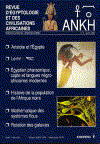|
ANKH n°2,
avril 1993, pp. 85 - 123.

.
|
Le Basaá, l’égyptien pharaonique et le copte. Premiers jalons
révélateurs d’une parenté insoupçonnée
Résumé
: Si les concordances grammaticales sont
généralement admises comme décisives pour établir une parenté
génétique entre deux langues, il n’en demeure pas moins que les
faits de vocabulaire constituent les premières données qui
attirent l’attention du comparatiste et l’incitent ou non à
rechercher les éventuelles concordances grammaticales.
C’est l’objet de cette modeste étude
inaugurale que de verser dans le dossier Égypte pharaonique et
langues africaines — magistralement ouvert par Cheikh Anta D IOP
et brillamment suivi par Théophile OBENGA et dont la fécondité
avait été pressentie par maints précurseurs dont le bantouiste
Karl MEINHOF (1915) et l’égyptologue Jean CAPART (1941) — le
témoignage original d’une autre langue bantou moderne, le Basaá
parlé au Cameroun, classé A43a par GUTHRIE.
Les données présentées ici, lesquelles se
laissent comparer et s’apparentent de manière frappante à
différentes synchronies de l’égyptien (du pharaonique au copte),
constituent un inventaire provisoire d’un corpus en constant
élargissement.
Cinquante-cinq termes environ sont examinés et la
mise en évidence de certaines correspondances régulières, aussi
bien phonétiques que sémantiques, est illustrée par un
échantillon de vingt formes apparentées dont quinze sont
vocaliques et cinq consonantiques.
Leur variété et leur singularité témoignent déjà
de l’intimité spirituelle, conceptuelle et culturelle des deux
univers considérés, en attendant le verdict prochain des
correspondances grammaticales.
Abstract
:
Basaá, Pharaonic and Coptic - First steps revealing an
unsuspected relationship.
— Although grammatical
correspondences are generally admitted as a conclusive proof of
genetic relationship between two languages, vocabulary turns out
to be the first data which draw the comparative linguist’s
attention and prompt him or not to search for possible
grammatical correspondences.
The purpose of this unpretentions
preliminary article is to bring into the comparison between
Egyptian (hieroglyphic and coptic) and African languages an
additional body of evidence provided by another modern Bantu
language (classified A 43a
by GUTHRIE) currently spoken in Cameroon, which exhibits
original, fresh and remarkable data of paramount importance
within the very field of African historical linguistics,
especially the new line of research masterly opened up by late
scientist Cheikh Anta DIOP and brilliantly followed on by
professor Théophile OBENGA. As regards methodology, due
attention is paid to the works of reputed forerunners among whom
rank the Bantuist Karl MEINHOF (1915) and the Egyptologist Jean
CAPART
(1941) who had pointed out earlier with some premonition the
fruitfulness of the comparison between Pharaonic Egyptian and
African languages.
The relevant data presented here which display a
strikingly good lexical matching between Basaá and Egyptian
synchronic variations (from Pharaonic to Coptic) represents but
a provisional inventory from steadily increasing corpus.
Fifty-five items are investigated and regular sound meaning
correspondences are illustrated by a sample of twenty cognate
forms, fifteen of which are vocalic and five consonantal.
The diversity and unusualness of this lexical
material are already indicative of the closeness of spiritual,
conceptual and cultural relationship between Pharaonic Egypt and
Basaá people living in Cameroon, while awaiting the verdict of
grammatical correspondences to come.
|

